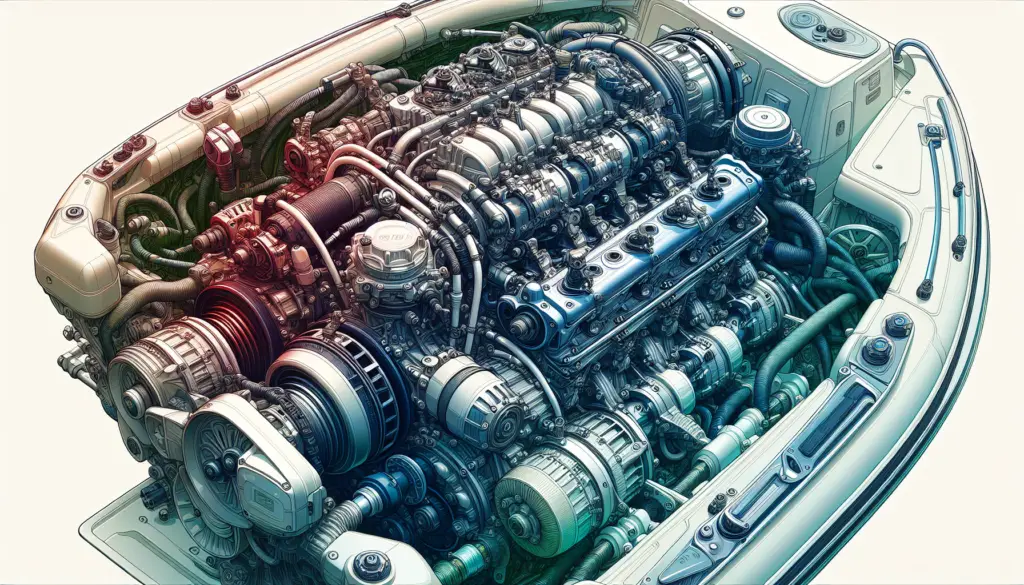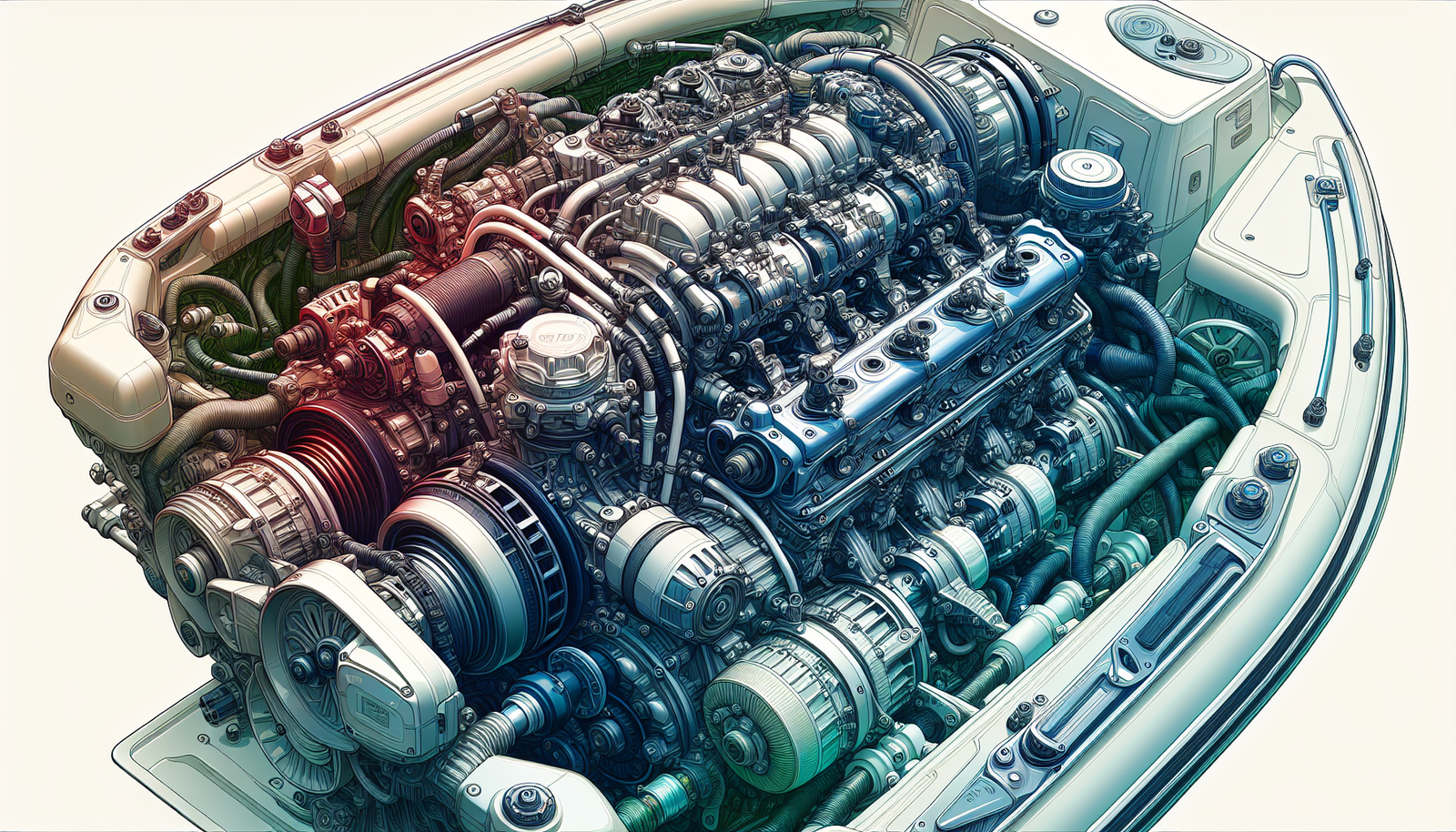Imagine you’re out on the waters, basking in the glory of a sunny day, when suddenly, the peaceful ambiance is disrupted by a loud, unusual noise from your boat’s engine. That jarring cadence is more than just a nuisance; it could flag a significant issue lurking within your boat’s mechanical heart. In “Understanding Boat Engine Noise and Vibration Issues,” you’ll understand the intricacies of these sounds and sensations, helping you identify issues that could potentially save you from expensive repairs and ensure your maritime adventures remain uninterrupted.

Understanding The Basics of Boat Engine Noise and Vibration
When you’re out at sea, having a silent, smooth-running boat engine is a luxury. Noise and vibration are common issues and it’s important to understand what exactly they are.
Definition of Boat Engine Noise
Engine noise is unwanted sound produced by the engine. It is influenced by the design of the engine and a number of mechanical components. The intensity of this sound can range from slight humming to an unbearable and damaging noise, which is disruptive and irritating.
Defining Vibration in Boat Engines
Vibration, on the other hand, is an oscillatory movement that happens around an equilibrium point. In simpler terms, it’s that shaking or quaking you may feel and it could stem from the operation of the engine itself or other mechanical components.
The Interdependence of Engine Noise and Vibration
Engine noise and vibration are closely interrelated, sometimes an increase in one may lead to an increase in the other. They’re both unintentional by-products of energy conversion and transmission processes which take place inside the engine.
Main Sources of Boat Engine Noise
There is a myriad of sources contributing to boat engine noise. Let’s look at a few of the common ones.
Engine Mechanical Components
Noise can result from piston slap, crankshaft rotations, gears, and other moving parts. The normal wear and tear of these parts can lead to increased noise levels.
Exhaust System Noise
The exhaust system, which takes away waste gases from the engine, can create quite a bit of noise if it is not kept in optimal condition.
Intake Noise
Intake noise comes from air being sucked into the engine. This can produce a noticeable sound, especially under heavy acceleration.
Vibration-Induced Noise
Vibration in the boat engine or other parts could lead to additional noise. For instance, poorly tightened components might vibrate and produce noise.
Causes of Vibration in Boat Engines
Now let’s see where the vibration comes from.
Engine Imbalance
Sometimes the rotating parts of the engine are not evenly distributed, leading to an imbalance which causes vibration.
Shaft Alignment Issues
Misalignment of the shaft, which transmits power from the engine to the propeller, can create significant vibration as well.
Careless Installation of Components
Proper installation matters, careless installation can lead to uneven pressure and consequently, vibration.
Loose or Worn Out Parts
Parts that are loose or worn out can vibrate against each other, causing increased vibrations.
The Impact of Noise and Vibration on Boat Performance
Excessive engine noise and vibration can have a significant impact on the overall performance of your boat.
Reduced Engine Performance
Excessive vibration can lead to mechanical damage, reducing the overall effectiveness and efficiency of the engine.
Increased Fuel Consumption
Increased noise and vibrations could mean your engine is overworking, resulting in a higher fuel consumption rate.
Enhanced Wear and Tear of Components
More vibrations imply more friction, which then translates to increased wear and tear of the engine parts.

Health Consequences of Prolonged Exposure to Engine Noise and Vibration
Ignoring these issues is not an option, especially when considering the potential health risks.
Impact on Hearing
Repeated exposure to loud engine noise can lead to hearing impairment or other hearing-related problems.
Vibration Related Injuries
The constant vibration could lead to physical health issues like hand-arm vibration syndrome or whole body vibration syndrome.
Stress and Anxiety
Excessive noise and vibration levels can create stress and anxiety, thus, reducing overall comfort of operating or riding a boat.
Diagnosing Boat Engine Noise and Vibration Issues
Diagnosing is the first step towards resolving your boat engine noise and vibration problems.
Physical Inspection
Sometimes, a simple physical inspection could pinpoint loose or worn out parts that might be causing the problem.
Use of Diagnostic Tools
Sophisticated tools can help understand the frequencies at which your engine is vibrating or the source of the noise.
Listening For Unusual Sounds
A careful ear can detect anomalies in the engine sounds pointing to an issue that might be developing.
Professional Assessment
There is no substitute for a professional assessment if you are struggling to diagnose the problem yourself.
Techniques for Mitigating Boat Engine Noise
reducing engine noise doesn’t have to be a complex task with these techniques.
Insulating Engine Compartment
You can encase the engine compartment with acoustic materials, this greatly reduces noise transmission.
Using Noise Intake and Exhaust Mufflers
Installing mufflers can reduce the noise levels generated by air intake and exhaust systems.
Engine Mounts Changes
Changing your engine mounts could significantly bring down vibration-induced noise.
Solutions for Addressing Boat Engine Vibration
Here are some strategies to get rid of disruptive vibration.
Balancing the Engine
A well-balanced engine mitigates a lot of unwanted vibration.
Checking Shaft Alignment
Ensuring proper shaft alignment could minimize unnecessary vibrations.
Replacing Worn Out Parts
Replace parts that have worn out, to reduce excess vibration.
Maintenance Practices to Reduce Noise and Vibration
A regular maintenance routine can do wonders for reducing noise and vibration.
Regular Boat Engine Servicing
Keeping your engine well-oiled and serviced can help minimize noise.
Timely Replacement of Worn Out Components
Components that are nearing the end of their lifespan must be replaced in a timely manner.
Regular Hull Cleaning
Ensure you clean your boat’s hull regularly to reduce resistance which might lead to more vibration.
Reviewing The Latest Technology and Innovations for Noise and Vibration Reduction
New technology and innovations are making it easier to control the noise and vibration levels.
Use of Anti-vibration Mounts
These are designed to absorb a large percentage of engine vibration, thereby reducing overall noise and vibration levels.
Active Noise Control Systems
Active noise control (ANC) systems use destructive interference to decrease engine noises or even cabin noises
Soundproofing Materials
Modern soundproofing materials can help dampen a large range of frequencies, helping in reducing overall noise levels.
In conclusion, effective management of boat engine noise and vibration benefits not only you and your comfort but also the longevity of your boat. Always ensure that you are updated with innovative techniques to handle noise and vibration and seek professional advice whenever necessary.

